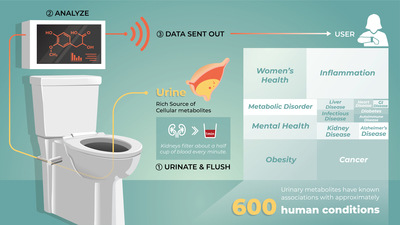Could a toilet monitor your health?

A team of metabolism scientists at the University of Wisconsin-Madison and the Morgridge Institute for Research are working to drive forward personalised medicine using the metabolic health information contained in urine.
In addition to information about an individual’s nutritional habits, exercise, medication use, sleep patterns and other lifestyle choices, urine contains metabolic links to more than 600 human conditions, including cancer, diabetes and kidney disease.
The team is investigating if frequent monitoring and testing of urine samples can provide useful real-time health information and if a technology platform can be adapted to toilets to make the collection process simple, accurate and affordable.
In a small pilot study conducted this year — with results published in Nature Digital Medicine — two research subjects (the authors of the paper) collected urine samples over a 10-day period. The samples were submitted for gas chromatography and mass spectrometry tests for a complete readout of metabolic signatures.
The subjects — Joshua Coon, Thomas and Margaret Pyle Chair at the Morgridge Institute and UW-Madison Professor of Biomolecular Chemistry and Chemistry; and Ian Miller, data scientist with the Coon Research Group — collectively provided 110 samples over the 10-day period, wearing technology to track heart rates, steps, calorie consumption and sleep patterns.
The results demonstrated the urine samples’ ability to reflect the ebbs and flows of daily life. For example, the subjects kept records of coffee and alcohol consumption, and the biomarkers with a known connection to these drinks were abundantly measured. One subject took acetaminophen, which was measured in urine by a spike in ion intensity. The metabolic outputs from exercise and sleep were also measured with precision.

The Coon Research Group is designing a toilet that will incorporate a portable mass spectrometer that can recognise the individual and process samples across a variety of subjects. The group plans to install the toilet in their research building and expand the user group to a dozen or more subjects.
“We know in the lab we can make these measurements,” Coon said. “And we’re pretty sure we can design a toilet that could sample urine. I think the real challenge is we’re going to have to invest in the engineering to make this instrument simple enough and cheap enough. That’s where this will either go far or not happen at all.”
While the pilot experiment didn’t examine health questions, many possibilities exist. For example, testing could show how an individual metabolises certain types of prescription drugs in ways that could be healthy or dangerous. Also, as the population gets older with more stay-at-home care, urine tests could indicate whether medications are being taken properly and having their intended effect.
Coon believes the ‘smart toilet’ concept could have major population health implications.
“If you had tens of thousands of users and you could correlate that data with health and lifestyle, you could then start to have real diagnostic capabilities,” he said. “It might provide early warning of viral or bacterial outbreaks.”
Artificial touch boosted by brain-controlled bionic hand
New research suggests that a complex sense of touch for people with spinal cord injuries is now a...
Patient-specific 3D models to assist in surgery
UNSW engineers have their sights on developing anatomically accurate 3D printed models which...
Alfred Health deploys GE system to optimise operations
The system is designed to enhance situational awareness, communication, and overall operational...









